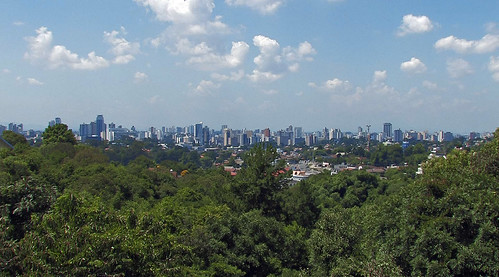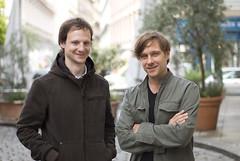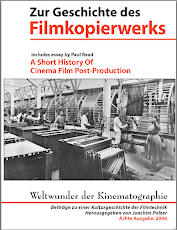 Film-Nr.: 372
Film-Nr.: 372Vorführungstermin: Freitag, 14. August 2009, 21.30 Uhr (Hauptfilm) [VN37]
Themenschwerpunkt: Neues Denken aus Brasilien (3)
Englischer Titel: Curitiba - it's possible
Originaltitel: Curitiba - it's possible
Deutscher Titel: Curitiba - Es ist möglich!
Herkunft: Österreich 2008
Laufzeit: 45 min.
Sprachfassung: Deutsch-Portugiesische Sprachfassung mit englischen Untertiteln
Regie: Joerg Pibal, Paul Romauch
Produzent: Joerg Pibal, Paul Romauch
Schnitt: Joerg Pibal, Paul Romauch, Peter Priglinger (sound)
Kamera: Paul Romauch
Sprecher: Matthias Luhn
Produktion: 8film, Wien
URL Film-Homepage: http://8film.at/
Premierenstatus: Deutsche Erstaufführung
Bisherige Aufführungen: Portobello Film Festival, London, UK; Inspired Lisabon, Lisbon, Portugal; World Design Capital, Turin, Italien; Universum Filmtage Klagenfurt, Österreich, u.a.
Kurzinhalt: Wenn ein Architekt Bürgermeister wird: Innovative Stadtentwicklung verbunden mit der Umsetzung ökologischer Konzepte für eine lebenswerte Urbanität am Beispiel der brasilianischen Stadt Curitiba.
Trailervideo: http://blip.tv/file/2252830 + http://www.youtube.com/watch?v=Q-nD2Y4b7QQ&feature=PlayList&p=4B4FE5E49176D406&index=19
Bonusmaterial: Jaime Lerner speaks about "A Humane City": http://blip.tv/file/2280562
Englische Synopsis: Curitiba, Paraná. The „ecological capital“ of Brazil. A city that is following an exceptional road.

Englische Werkbeschreibung: Curitiba’s development was similar to that of other Brazlian cities, but in the early seventies of the 20th century, the city chose to pursue an independent and exceptional course of action. At that time, the 31 year old mayor and architect Jaime Lerner and his team set new benchmarks with their innovative and sustainable planning strategies. Little by little, the quality of life increased for Curitiba’s citizens and eventually the city became the „ecological capitol of Brazil“. To see the city as an organic, not mechanic structure, to raise awareness, to place responsibility and to prove, that small impulses can lead to something bigger – these were the cornerstones, that made Curitiba the place it is today. The city’s innovative solutions have been working for almost 40 years now and, despite problems and difficulties mainly due to its fast growth, Curitiba is still progressing! Instead of an expensive subway Curitiba has a effective bus system, called the Bus Rapid Transit. Extra long double-articulated busses, developed in Curitiba, provide convenient public transport on the main axes of the system. Special bus lanes in the middle of the main streets allow free-flowing bus traffic, and the rest of the traffic flows in both directions left and right from the bus lanes.

The so-called 'University for Environment' was inaugurated by Jaime Lerner in 1991 as a department of the City Hall of Curitiba. Today it is a non-profit private company and it functions as an information center concerned with environmental issues related to the disorganized growth of cities. The architecture of the building, embedded in a park, is unique. At the inauguration the famous oceanographer Jacques Costeau said, 'I have never seen an initiative such as this, here in Curitiba. This is an example that should be followed all over the world!” To provide easy access to information for the citizens of Curitiba, centers of learning, so called 'lighthouses of knowledge' were created; available free of charge. Often connected to schools, these facilities offer access to books and the Internet. Spread out all over the city, the 'lighthouses of knowledge' are prominent staging posts, which, besides their informal and cultural function, provide an interesting architectural accent to the urban landcape.

To create environmental awareness and to facilitate the work of the garbage removal service in areas difficult to access, the city of Curitiba developed the project 'Lixo que nao e lixo' – 'Garbage that's not garbage' in the early 1990s. Today the program is called 'Cambio Verde', 'Green Exchange', in which garbage is traded for groceries. The program helps the particularly poor and solves the problem of waste disposal in the favelas - the shanty towns - at the same time. Any kind of recyclable garbage is accepted and registered on special tokens, depending on the amount of garbage brought. With these tokens groceries can be picked up at public counters. There are many inspiring projects in Curitiba, that show out how innovative solutions are possible within a limited budget. The city demonstrates how sustainable changes can be accomplished, even under difficult and unfavorable conditions.

GLOBIANS DOC FEST BERLIN
August 12 - 17, 2009
Kino Toni, Antonplatz












Keine Kommentare:
Kommentar veröffentlichen
Hinweis: Nur ein Mitglied dieses Blogs kann Kommentare posten.